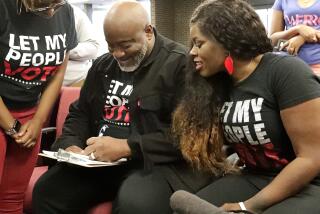Quick Phone Checks on Gun Buyers Proposed : Firearms: Thornburgh says an instant in-store system to weed out felons could cost $27 billion. The NRA favors it.
- Share via
WASHINGTON — Atty. Gen. Dick Thornburgh Monday proposed that handgun dealers be required to make an on-the-spot telephone check with law enforcement record-keepers to determine whether a customer is a convicted felon and thus prohibited from buying a gun.
In a report mandated by Congress, which would have to appropriate funds to develop the system, Thornburgh said that total costs of establishing the computer network of data to implement his proposal could run as high as $27 billion over the several years it would take to install it.
The FBI would have to establish a high-technology system to make 8.5 million fingerprints available over telephone lines. All felony conviction records nationally would have to be computerized; only about half are now.
The proposal pleased the National Rifle Assn., which said that Thornburgh’s recommendations to supply gun dealers with computerized conviction records and fingerprints on file with the FBI are “positive steps” toward establishing a point-of-sale screening system.
The NRA and other advocates of private gun ownership long have sought to avoid waiting periods, which give officials time to weed out criminals from the majority of law-abiding citizens who purchase firearms.
At the same time, Thornburgh’s action is expected to draw fire from handgun-control proponents and some law enforcement groups, which view such a system as a substitute for their long-sought national seven-day waiting period for handgun purchases.
Susan Whitmore, a spokesman for Handgun Control Inc., said that Thornburgh’s proposed system is so complex and would take so long to develop that, in effect, his proposal is “postponing implementation of a screening system.” Whitmore added that “the need for congressional action on a waiting period is now essential.”
A waiting-period measure currently pending in Congress is known as the “Brady bill,” named for former White House Press Secretary James S. Brady, who was severely wounded in the 1981 assassination attempt on former President Ronald Reagan. Brady is scheduled to testify on behalf of the bill this week.
Many states already have weeklong waiting periods, which are designed to allow prospective purchasers to “cool off” if they are seeking a gun out of anger or for a criminal act. During this period, local law enforcement officers are notified so that they can check out the prospective buyers’ backgrounds.
California and Tennessee have 15-day waiting periods.
In his report, Thornburgh declared that “the goal of keeping firearms out of the hands of felons is deeply held by this Administration.” He noted that President Bush, who advocates private gun ownership, had submitted proposals to Congress to strengthen penalties for the use of firearms in the commission of crimes.
However, given the current status of criminal records throughout the country, a complete record check requested by a gun dealer could take up to a month, he said.
“Such a delay would impose an unreasonable burden on legitimate gun purchasers, and therefore is unacceptable,” Thornburgh said.
He explained that he envisions a touch-tone telephone system in which any federally licensed firearms dealer could immediately get a computerized check of all “criminal records information currently on file with the states or the federal government.”
But such a data base “cannot be created overnight,” Thornburgh said. “It will require significant effort and expenditure on the part of both the states and the FBI.”
He emphasized that no system could be 100% effective in keeping guns out of the hands of criminals because “the reality is that felons obtain guns through many illegal, unlicensed means.”
Thornburgh said one survey showed that 84% of imprisoned felons who admitted to owning firearms had obtained them “on the streets and not from licensed dealers.”
More to Read
Get the L.A. Times Politics newsletter
Deeply reported insights into legislation, politics and policy from Sacramento, Washington and beyond. In your inbox twice per week.
You may occasionally receive promotional content from the Los Angeles Times.










